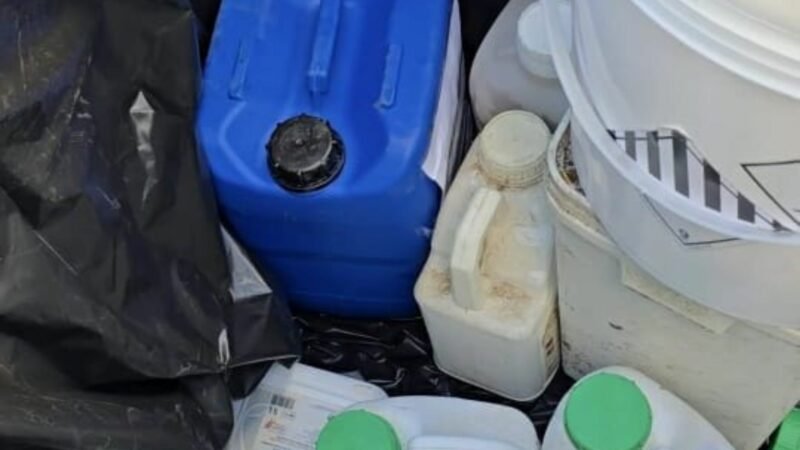
Recovery of agricultural chemical waste in Guadeloupe. Photo by Olivia Losbar, used with permission.
In Guadeloupe, a French-speaking Caribbean island whose recent history has been marked by a chlordecone pollution scandal, agricultural waste management is a major challenge.
Chlordecone is a toxic pesticide, once widely used for controlling banana root borers in the Caribbean, that has been linked to all sorts of health issues in humans, including cancer, neurotoxicity, organ damage, and reproductive damage. It does not easily break down in the environment, which means that it can linger in soil and water for decades, accumulating in the food chain and contaminating crops, fish, and water. In the French Caribbean, it contaminated entire ecosystems, leading to long-term health crises.
These severe risks led to the product being banned in the United States in 1976 after workers at a Virginia factory that was manufacturing the chemical suffered from poisoning; the European Union soon followed suit. In the French Caribbean, however, its use continued until 1993, worsening the contamination crisis. Chlordecone is now listed under the Stockholm Convention on Persistent Organic Pollutants, restricting its global production and use.
In Guadeloupe, the widespread use of phytosanitary products and agricultural plastics has also had serious consequences: lasting soil pollution, contamination of groundwater and coral reefs, and greenhouse gas emissions linked to uncontrolled incineration.
The impacts on human health are just as alarming: the Kannari study, carried out by ANSES (the French Agency for Food, Environmental, and Occupational Health and Safety) and Santé Publique France between 2013 and 2014, revealed that chlordecone was detected in over 90 percent of the local population, with increased risks of serious illnesses, including cancers.
This finding highlights the need to find local, sustainable and inclusive solutions to this crisis.
A farmer’s awakening to illness
The story of Rémi Phoudhia, a Guadeloupean farmer affected by cancer — which was attributed to his prolonged exposure to pesticides — highlights the urgency of this transition.
“I don’t want to use any more products,” the 60-year-old says. “I’m trying to go organic. I went through a very serious illness linked to pesticides, so now I want to get rid of all that.”
Phoudhia decided to change his farming practices with the help of local initiatives that support him in managing his agricultural waste responsibly, and reducing his use of chemical inputs.
“Every time there’s an agricultural waste collection, I come along,” Phoudhia explains. “Young people now understand the dangers. But in my day, we didn’t know; we used to get rid of products under the mango tree. Now we know, we’re more careful.”
An innovative solution
Faced with so many stories like Phoudhia’s arising out of these issues, Agrivalor Guadeloupe, an eco-organisation created in 2017, has been offering farmers a concrete, innovative response. Its main mission is to collect and recover existing agricultural waste in order to minimise the environmental and health impacts associated with its mismanagement.
All the players in the sector — importers, distributors and farmers — rallied together to enable its creation. The organisation has set up a network of eight collection points strategically distributed throughout the Guadeloupean archipelago. Through a programme aimed at both large and small-scale producers, these collection hubs enable farmers to dispose of their used plastics and other toxic products, including empty packaging drums, banana sleeves, fertiliser bags, non-usable plant protection products, and protective equipment, in safe conditions.

A farmer deposits waste at a harvest organised by an agricultural cooperative in Le Moule, Guadeloupe. Photo by Olivia Losbar, used with permission.
Thierry Saman, an agent at SAP Caraïbes, is part of the team that collects hazardous waste. He has noticed an evolution since the first collections: “At the beginning, there were a lot of products. Now there are fewer and fewer, which is good for the environment.”
Measurable impact on climate and health
Through the regular recovery of this waste, there has been a direct correlation between the reduction of greenhouse gas emissions associated with uncontrolled incineration and the discharge of toxic products into the environment.
The approach being used also promotes a circular economy, reducing the need to produce new polluting materials. For farmers like Phoudhia, it represents a crucial aid in their transition to sustainable agricultural practices.
The organisation continues to provide both technical and logistical support, enabling farms of all sizes to meet ecological and climatic standards while reducing the environmental and economic inequalities associated with waste management. Agrivalor believes it is a model that can be replicated in other island regions facing similar problems.
By combining technical innovation and environmental responsibility while at the same time reducing inequalities, this partnership with farmers is working hard to build a more sustainable future for Guadeloupe.

